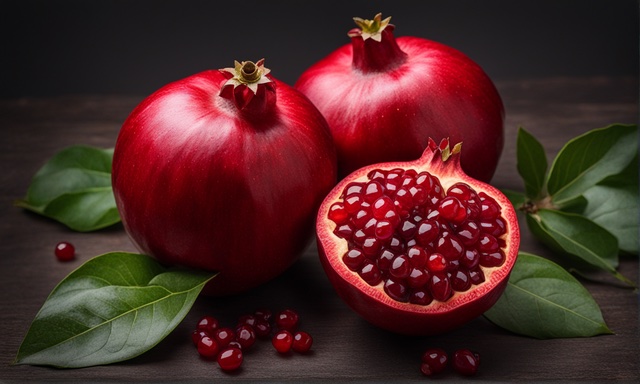Internet Asks: "Pomegranate Glycemic Index"
Pomegranates, with their ruby red arils, are not just visually stunning but also a powerhouse of nutrients. For those monitoring their blood sugar levels or following a glycemic-index-conscious diet, understanding where pomegranate stands on the GI scale is essential. This article explores the glycemic index of pomegranate and what it means for your dietary choices.
sponsored links

Understanding the Glycemic Index (GI)
The glycemic index is a system that ranks foods based on their impact on blood glucose levels. Foods with a high GI cause rapid spikes in blood sugar, whereas low-GI foods have a slower, more gradual effect.
Pomegranate’s Glycemic Index
- Pomegranates have a relatively low glycemic index, typically ranging between 35 and 40. This means that the sugar in pomegranate is absorbed slowly into the bloodstream, causing a gradual rise in blood sugar levels.
- The low GI of pomegranate can be attributed to its high fiber content and the type of sugars it contains.
Nutritional Profile of Pomegranates
Pomegranates are not just low in GI; they are also rich in essential nutrients:
- - Antioxidants: They are packed with antioxidants, particularly punicalagins and anthocyanins, which help fight oxidative stress.
- - Vitamins and Minerals: They are a good source of Vitamin C, Vitamin K, folate, and potassium.
- - Fiber: Pomegranates contain a significant amount of dietary fiber, which aids in digestion and further helps in stabilizing blood sugar levels.
- - Anti-inflammatory Properties: The compounds in pomegranates have anti-inflammatory effects.
sponsored links
Health Benefits of Pomegranates
- 1. Cardiovascular Health: Regular consumption can improve heart health by maintaining healthy cholesterol levels and blood pressure.
- 2. Diabetes Management: The low to moderate GI of pomegranates makes them suitable for people with diabetes, as they do not cause significant blood sugar spikes.
- 3. Cancer Prevention: Some studies suggest that the antioxidants in pomegranates can help reduce the risk of certain types of cancer.
- 4. Weight Management: Their fiber content contributes to a feeling of fullness, aiding in weight control.
Incorporating Pomegranates into Your Diet
- - Fresh Seeds or Juice: Enjoy the seeds directly from the fruit, or consume pomegranate juice (preferably unsweetened) in moderation.
- - Salads and Yogurts: Add pomegranate seeds to salads, yogurts, or oatmeal for a burst of flavor and nutrition.
- - Balanced Portions: While pomegranates are low in GI, it's important to consume them in moderation as part of a balanced diet.
Conclusion
Pomegranates are a delightful addition to a healthy diet, offering not just tantalizing flavors but also a range of health benefits. Their low to moderate glycemic index makes them a safe choice for most people, including those managing diabetes or watching their sugar intake. By incorporating pomegranates into your diet, you can enjoy their sweet taste and nutritional benefits without significantly impacting your blood sugar levels.
Disclaimer: This article is for informational purposes only and not intended as medical advice. Consult with healthcare professionals for personalized dietary advice, especially if you have specific health concerns or dietary requirements.
sponsored links
References
1. USDA FoodData Central. Pomegranates, raw. https://fdc.nal.usda.gov/fdc-app.html#/food-details/169134/nutrients
2. Stowe CB. The effects of pomegranate juice consumption on blood pressure and cardiovascular health. Complement Ther Clin Pract. 2011 May;17(2):113-5. doi: 10.1016/j.ctcp.2010.09.004. PMID: 21457902.
3. Gil, M.I., Tomás-Barberán, F.A., Hess-Pierce, B., Holcroft, D.M., & Kader, A.A. (2000). "Antioxidant activity of pomegranate juice and its relationship with phenolic composition and processing." Journal of Agricultural and Food Chemistry, 48(10), 4581-4589.
4. University of Murcia. Glycemic Index Values. https://www.um.es/lafem/DivulgacionCientifica/CienciaySalud/Portalyblog/cienciaysalud.laverdad.es/lanutricionesconciencia/06-Salud/Complementario/glycemicindex.pdf
5. Harvard Health Publishing, Harvard Medical School. Glycemic index for 60+ foods. https://www.health.harvard.edu/diseases-and-conditions/glycemic-index-and-glycemic-load-for-100-foods
6. Glycemic Index Foundation. GI and Diabetes. https://www.gisymbol.com/gi-and-diabetes/
People are also reading...
Apple Cider Vinegar pH
Does Apple Cider Vinegar Break a Fast?
Does Apple Cider Vinegar Expire?
Apple Cider Vinegar and Cranberry Juice for Weight Loss
See the answer to: "Apple Cider Vinegar and Cranberry Juice for Weight Loss"
️Apple Cider Vinegar and Cranberry Juice Weight Loss
See the answer to: "Apple Cider Vinegar and Cranberry Juice Weight Loss"
Cranberry Juice Apple Cider Vinegar
Orange Juice pH?
Does Kahlua Have Caffeine?
Calories In a Grilled Cheese?
Is Watermelon Acidic?
6 oz Steak Calories?
Are Strawberries Acidic?
Ready to level-up?
Create meal plans 10x faster, follow up with your clients through our mobile app, and never struggle with meal planning or recipe management again.